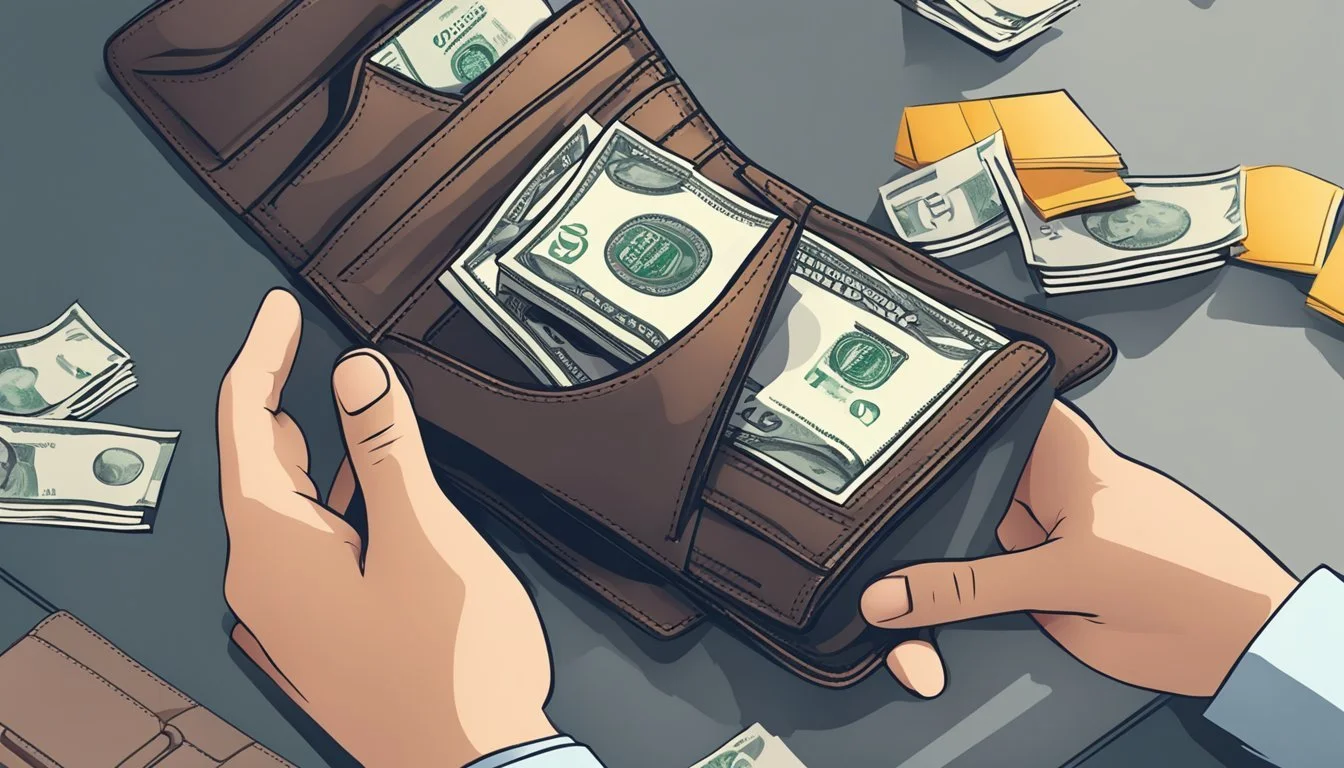11 Tactics Narcissists Use to Control Their Partner's Spending Habits
Identifying Manipulative Behaviors
Narcissists often employ various tactics to control their partner's financial decisions to maintain dominance. These manipulative strategies can have a profound impact on the victim's autonomy and self-esteem, making it challenging for them to manage their resources independently.
Understanding these tactics can empower individuals to recognize and address financial control issues in their relationships. By identifying these behaviors, people can seek the necessary support and take steps to reclaim their financial independence.
1) Frequent Criticism of Spending Choices
Narcissists often gain control by frequently criticizing their partner's spending choices. They may belittle purchases, deeming them unnecessary or wasteful. This constant disapproval can make the partner feel guilty or insecure about their financial decisions.
The criticism usually extends to questioning the partner's ability to manage money. By constantly undermining their confidence, the narcissist ensures their partner remains dependent and uncertain.
This tactic also involves comparing the partner's spending habits unfavorably with others. Such comparisons create a sense of inadequacy and encourage the partner to seek approval for future purchases, furthering the narcissist's control over financial decisions.
Frequent criticism can lead to the partner avoiding spending altogether, fearing negative repercussions. This creates an imbalance in the relationship, allowing the narcissist to dictate financial matters to their advantage.
2) Setting Strict Budgets Without Input
Narcissists often set strict budgets for their partners without seeking their input. This tactic allows them to entirely control the financial situation, making their partner feel powerless and dependent. By imposing unrealistic financial limits, they can restrict their partner’s ability to make independent decisions.
This lack of collaboration in budgeting can extend to everyday expenses. The partner may have to justify every purchase, no matter how small, leading to constant scrutiny and anxiety. Such behavior undermines the partner’s financial autonomy and self-esteem.
Further complicating the scenario, the narcissist may present these budgets as beneficial or necessary, masking their controlling nature under the guise of financial responsibility. This can make it difficult for the partner to challenge the restrictions.
In severe cases, the rigid budget can limit access to essential resources. This can result in the partner being unable to afford basic needs or personal desires, deepening their reliance on the narcissist. This form of financial control can have long-term impacts on the partner’s financial stability and personal freedom. For more about how financial control affects relationships, visit Psych Central.
3) Monitoring Bank Accounts Closely
Narcissists often keep a vigilant eye on their partner's bank accounts. This constant monitoring allows them to control financial transactions and ensure that their partner remains financially dependent.
By frequently checking account balances and scrutinizing transactions, they make it difficult for their partner to spend money freely. This behavior fosters an environment of constant financial anxiety.
Additionally, narcissists may require their partner to seek permission before making withdrawals or purchases. This tight control over finances discourages independence and reinforces the power imbalance in the relationship.
They may also use access to bank accounts to accuse their partner of improper spending. By doing so, they justify their own need to maintain control over the finances and perpetuate a cycle of blame and restriction.
4) Insisting on Joint Accounts Only
Narcissists often insist that their partner shares a joint account with them. By doing this, they can monitor all financial activities closely. Any spending outside their approval can easily be noticed and questioned.
This tactic allows them to exert more control over their partner's financial independence. It limits the partner’s ability to make personal purchases without the narcissist's scrutiny. If questioned, the narcissist may justify this demand by claiming it promotes transparency and trust.
Restricting access to individual accounts prevents the partner from having private funds. This makes it difficult for them to save money secretly. Without their own financial resources, the partner may feel trapped and unable to leave the relationship.
In addition, having joint accounts means all significant decisions need the narcissist’s approval. This can include paying for essentials or making necessary purchases. This constant need for approval can be emotionally draining and limiting for the partner.
Overall, the partner's financial autonomy is severely restricted with this method. Narcissistic financial abuse often includes such strategies to maintain control and dependency. The partner’s sense of financial security becomes conditional on the narcissist's whims and demands.
5) Giving Allowances Instead of Full Access
Narcissists often exert control over their partner's finances by providing allowances rather than granting full access to shared resources. This tactic limits the partner's financial independence.
Restricting access to the full financial picture creates a dependency on the narcissist for daily expenses. It can inhibit the partner's ability to save or make independent financial decisions.
By controlling the funds, the narcissist maintains power and ensures their partner remains reliant on them. This can lead to long-term financial insecurity for the partner.
In some cases, the allowance may be arbitrarily adjusted based on the narcissist’s whims. This unpredictability adds to the partner's financial instability and stress, further enhancing the narcissist's control.
Granting only limited financial access can also make it difficult for the partner to leave the relationship if they choose to. This financial dependency traps them, reinforcing the narcissist’s hold over both their finances and their broader life choices.
6) Complaining About Financial Stress
Narcissists often complain about financial stress to manipulate their partner’s spending habits. This tactic involves constantly emphasizing financial difficulties, whether real or exaggerated.
By portraying themselves as burdened with financial worries, they create a sense of guilt and responsibility in their partner. This guilt can lead to the partner restricting their own spending to ease the perceived burden.
This tactic also shifts the focus away from the narcissist’s spending and redirects attention to the partner’s financial behavior. It creates an environment where the partner feels they must validate every purchase and justify their financial decisions.
In some cases, the narcissist may overstate their financial contributions or hardships, making the partner feel indebted or unfairly generous. This can lead to further control and dominance in the relationship.
Frequent complaints about financial stress can result in the partner becoming financially dependent on the narcissist, as they may be discouraged from seeking independent financial stability. This dependency strengthens the narcissist’s control and makes the partner more vulnerable.
This manipulation creates an ongoing cycle where the partner feels pressured to act in accordance with the narcissist’s wishes, all in an effort to reduce the alleged financial stress.
7) Using Guilt Trips Regarding Expenses
Narcissists often use guilt to control their partner's spending habits. They may blame their partner for financial issues, even when the spending was necessary or agreed upon. This tactic shifts the responsibility and makes the partner feel ashamed or anxious about spending.
They might frequently remind their partner of past expenses, emphasizing how those choices negatively impacted their finances. This constant guilt works to instill a sense of fear and hesitation in spending money on anything, even necessities.
By playing the victim and expressing distress over the alleged financial strain, the narcissist manipulates their partner into curbing their expenses. This creates an environment where the partner second-guesses their financial decisions, constantly doubting their choices.
For those experiencing these manipulative tactics, understanding the methods of guilt trips used by narcissists can be a crucial first step in recognizing and addressing the issue.
8) Making Important Financial Decisions Alone
One tactic that narcissists employ to control their partner's spending habits is making important financial decisions alone. This involves bypassing discussions with their partner to exert control and maintain power within the relationship.
In such scenarios, the narcissist might open new accounts, take out loans, or make significant purchases without consulting their partner. This creates financial instability and leaves the partner unaware of their true financial situation.
This approach often results in the partner feeling disempowered and uncertain. They might struggle to manage household expenses or budget appropriately due to the lack of transparency and communication.
By excluding their partner from important financial decisions, narcissists reinforce the power imbalance. This isolation can further entrench the partner's dependence on the narcissist for financial security and decision-making.
To learn more, visit this article on financial abuse by narcissists. They cover various aspects of how narcissists can manipulate finances.
9) Limiting Access to Financial Information
Narcissists often limit their partner's access to financial information as a means of exerting control. By keeping financial details hidden, they create an imbalance of power within the relationship.
This control tactic can include not sharing bank account details, hiding financial statements, or avoiding discussions about money. The partner is left in the dark about their own financial standing.
This lack of transparency often results in the partner being unable to make informed decisions. It also makes it difficult for them to plan for the future or understand the financial implications of the narcissist's actions.
By monopolizing financial information, narcissists can manipulate their partner's financial dependence. This strategy ensures that the partner remains reliant on them for monetary needs.
Limiting access to financial information is a subtle but effective way to maintain dominance. It fosters an environment where the narcissist can exert continuous control over their partner's life and choices.
Recognizing this tactic is crucial for those experiencing financial abuse. Awareness can be the first step toward regaining control and seeking help. This behavior creates an unhealthy dynamic that can be difficult to escape without external support.
10) Sabotaging Partner’s Job or Income Opportunities
Narcissists often engage in tactics to sabotage their partner's job or income opportunities. This can take several forms, including undermining their confidence. They might criticize their partner's skills, qualifications, or professional decisions, making them doubt their own abilities.
Another common tactic is creating distractions at critical times. Narcissists may suddenly demand attention or cause crises just before important meetings or deadlines. This constant distraction can harm their partner’s performance and reputation at work.
Narcissists might also directly interfere with their partner’s networking opportunities. They could create conflicts during social or professional events to prevent their partner from forming valuable connections. In some cases, they might even spread rumors or lies to damage their partner's professional relationships.
In more extreme cases, narcissists may attempt to control their partner’s financial independence by forcing them to quit their job. This ensures the partner remains dependent on the narcissist for financial support, further solidifying the narcissist's control.
These behaviors can cause significant professional setbacks. Partners may find themselves overlooked for promotions or losing job opportunities completely. The emotional toll can also be severe, leading to stress and decreased job satisfaction. The consequences of such sabotage underline the manipulative and damaging nature of these tactics.
11) Using Finances as a Form of Punishment
Narcissists often weaponize finances to exert control and punish their partners. They might withhold money to create fear and reliance. Such tactics destabilize the victim's sense of independence and security.
Financial punishment can take various forms. For some, it involves restricting access to joint accounts or refusing to provide funds for basic needs. This forces the partner to ask for money, reinforcing control dynamics.
In other cases, narcissists may monitor and criticize spending habits meticulously. Any purchase can be scrutinized and used as an excuse for punishment. This constant oversight can make the victim doubt their financial decisions.
Another tactic includes unexpected financial penalties. Narcissists may impose arbitrary "fines" for behaviors they dislike. This unpredictability enhances the victim’s anxiety and compliance.
Credit card manipulation is also common. Narcissists might rack up debt in their partner’s name, damaging credit scores and financial futures. This creates long-term dependence and limits future financial freedom.
These financial punishments are not just about money. They are strategic moves to undermine confidence, enforce dependency, and erode the partner’s autonomy and wellbeing.
Understanding Narcissistic Control Over Finances
Narcissists often exert control over their partner's finances to maintain power and dominance in the relationship. This financial control can stem from psychological motivations and manifest in various detrimental behaviors.
The Psychology of Financial Control
Narcissists typically display significant levels of self-involvement and a need for admiration. They use financial control as a tool to assert their dominance and manipulate their partner. By restricting access to money, they create dependency, making it difficult for the partner to leave the relationship.
Often, narcissists view money not just as a means to an end, but as a source of power. They may exploit their partner’s financial insecurities to keep them off-balance and submissive. This behavior ensures the narcissist remains the central figure in their partner’s life, continually feeding their ego.
How Financial Control Manifests in Relationships
Financial abuse by narcissists can take many forms. They may control all household finances, providing their partner with an inadequate allowance or scrutinizing every expense. Joint accounts are often monitored obsessively, and the partner may be required to justify each transaction.
Narcissists might also sabotage their partner’s employment, either by discouraging them from working or by creating chaos in their professional lives. This tactic aims to undermine the partner's financial independence, making it increasingly hard for them to exit the abusive situation. Additionally, they may hide assets or accumulate debt in their partner’s name without consent, further entangling them in financial complications.
Financial control is a pervasive and destructive tactic used by narcissists to dominate their relationships, creating long-lasting impacts on the victim's emotional and financial well-being.
Identifying Financial Abuse in Relationships
Financial abuse in relationships involves tactics that limit a partner's access to financial resources, resulting in dependency and control. Recognizing the signs early can help prevent prolonged suffering and promote financial independence.
Recognizing Early Warning Signs
Recognizing early warning signs of financial abuse is crucial. One significant red flag is when a partner insists on controlling all financial decisions. This control often extends to having sole access to bank accounts and credit cards while denying the other partner any knowledge or access.
Another indicator is the partner's use of guilt or shame to manipulate spending habits. For instance, they may criticize their partner's spending choices, labeling them as irresponsible or wasteful, often leading to feelings of inadequacy.
Subtle tactics can also be used, such as monitoring spending closely and demanding detailed explanations for every purchase. This creates an environment of constant surveillance, where the affected partner feels they are always being watched and judged.
Impact on the Partner's Financial Independence
The impact of financial abuse on a partner's financial independence is profound. By limiting access to money and financial information, the abuser creates a dependency that is hard to break. This dependency often makes it difficult for the victim to leave the relationship.
Criticizing or belittling the partner's career choices or earning potential is another tactic. This can lead to decreased self-esteem and a reluctance to pursue career opportunities, further entrenching financial dependence.
In more severe cases, the abuser may pressure their partner to quit their job, sometimes using children or household responsibilities as excuses. This tactic ensures that the victim becomes entirely reliant on the abuser for financial support.
Financial independence is also hindered when the abuser takes out loans or credit in the partner's name without their consent, potentially ruining their credit score and making it difficult to secure financial resources in the future.
Strategies for Regaining Financial Control
Taking back control of your finances involves setting clear personal boundaries and understanding when to seek professional assistance. These steps can help mitigate the damaging effects of financial manipulation.
Establishing Personal Boundaries
Setting personal boundaries is crucial for regaining financial control. It helps in distinguishing one's finances from the controlling behavior of a narcissistic partner. Individuals should track their spending independently and maintain a separate bank account.
Having access to personal financial resources can prevent further manipulation. Regularly monitoring credit reports can also help detect any unauthorized activity. Understanding one's financial rights and responsibilities is essential. This knowledge empowers individuals to make informed decisions and resist coercive tactics.
Creating a budget tailored to personal needs and sticking to it fosters financial independence. Assertiveness in conversations about money and transparency in financial dealings can also reinforce these boundaries.
Seeking Professional Help
Professional guidance from financial advisors and mental health professionals can provide valuable support. Financial advisors can help with strategies to manage money effectively and establish financial goals. They can also offer advice on protecting assets and navigating financial disputes.
Mental health professionals can address the emotional and psychological impacts of financial abuse. Therapy sessions can assist in developing coping mechanisms and improving emotional resilience. In some cases, legal advice may be necessary.
Consulting with a lawyer can ensure that one's financial rights are protected, especially in complex situations like divorce. Seeking help from professionals provides a structured approach to overcoming financial abuse and regaining control.








